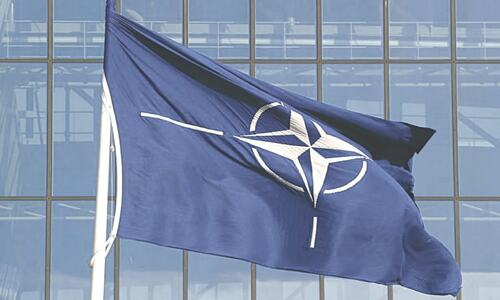 ISTANBUL: Ten Turkish soldiers have died in clashes with Kurdish rebels since April 20, signaling a seasonal upswing in fighting when winter snows melt and combatants are able to move around rugged terrain more freely.
ISTANBUL: Ten Turkish soldiers have died in clashes with Kurdish rebels since April 20, signaling a seasonal upswing in fighting when winter snows melt and combatants are able to move around rugged terrain more freely.
The renewed violence comes two months after Turkey staged a ground offensive against guerrillas based in Iraq with the help of US intelligence but without the active support of Iraqi Kurds. It also coincides with Turkish air and artillery strikes on cross-border targets, though experts say such tactics have limited impact on an elusive foe in a vast region.
The persistence of the rebel threat raises questions about whether Turkey might deem it necessary to stage another ground operation in Iraq against the rebel Kurdistan Workers’ Party, or PKK. The military says it is entitled to do so, but US-led calls for restraint and the prospect of a costly, inconclusive campaign could temper any Turkish zeal for another incursion.
“It’s something that they have to be considering,” said Aliza Marcus, author of “Blood and Belief: the PKK and the Kurdish Fight for Independence”.
Abdulkadir Onay, a Turkish lieutenant colonel and a visiting fellow at the Washington Institute for Near East Policy, compared Turkish military action in Iraq to what he described as “required” Israeli operations in Lebanon and Colombia’s recent air strike on a group of leftist rebels who were hiding just across the border in Ecuador.
“Just as the US military has targeted Al Qaeda camps in Afghanistan, Turkey will likely continue to tackle the PKK presence in neighbouring Iraq,” Onay wrote in an analysis this month.
Ahmet Banas, a PKK spokesman in northern Iraq, said rebels “have enough forces” to defend themselves if Turkey attacks in Iraq again. The PKK is estimated to have a total of 5,000 fighters, down by half from its peak in the early 1990s.
Some recent fighting with the rebel group occurred near Mt. Cudi in Sirnak province and similar mountain routes traditionally used by rebels to infiltrate Turkey from Iraq. But Turkish media said two soldiers were killed in Bingol province Sunday, hundreds of kilometers (miles) from Iraq.
Rebel units inside Turkey are believed to have considerable independence from their masters in northern Iraq, getting weapons and other supplies from local smugglers and carrying out hit-and-run attacks.
The PKK detonated 20 mines and roadside bombs from the beginning of this year until April 25, according to the Turkish General Staff. Authorities defused another 95 explosive devices. The military has reported the combat deaths of 10 soldiers and one member of a paramilitary force comprising village residents since April 20.
Rebels say they seek autonomy in the predominantly Kurdish southeast of Turkey, citing a history of discrimination and human rights abuses by the state. Turkey says the PKK is a terrorist group a view shared by Europe and the United States and says the state is committed to social and economic reforms to help the Kurds. Progress, however, is halting.
Turkey’s ruling party won more Kurdish votes in elections last year than a Kurdish party seen as the political wing of the PKK, suggesting many Kurds are tired of militancy. But the PKK’s profile rose when Turkey sent troops into northern Iraq for eight days in February despite US concerns about the threat to stability in the area controlled by Iraqi Kurds.
The Turkish military said it pummeled rebels in Iraq’s Zap region, though commanders said it was difficult to keep troops exposed for long in the harsh winter. The Feb 29 troop withdrawal came after US President George W. Bush told Turkish leaders to end the offensive as soon as possible; Turkey’s military denied it pulled out under US pressure.
Iraqi Kurds have refrained from tough action against their Turkish Kurd brethren, though Turkish commanders want them to arrest rebels and cut supply lines.
“In the best circumstances, it’s difficult for (the Turks) to fight in northern Iraq, especially without the Iraqi Kurds as an active partner,” said Marcus, the author. She also questioned the value of US military intelligence in parts of northern Iraq, where few American soldiers are stationed and the distances are huge.
Citing Turkish military eavesdropping on rebel communications, Sedat Laciner of the International Strategic Research Organisation in Ankara said the PKK endured an especially tough winter and “they lost a lot of militants”.
But he said the Turkish military had made some “wrong choices”, including the frequent use of conscripts and other soldiers without counterinsurgency training, as well as air raids. “You cannot destroy terrorists by bombing large areas,” he said.—AP















































